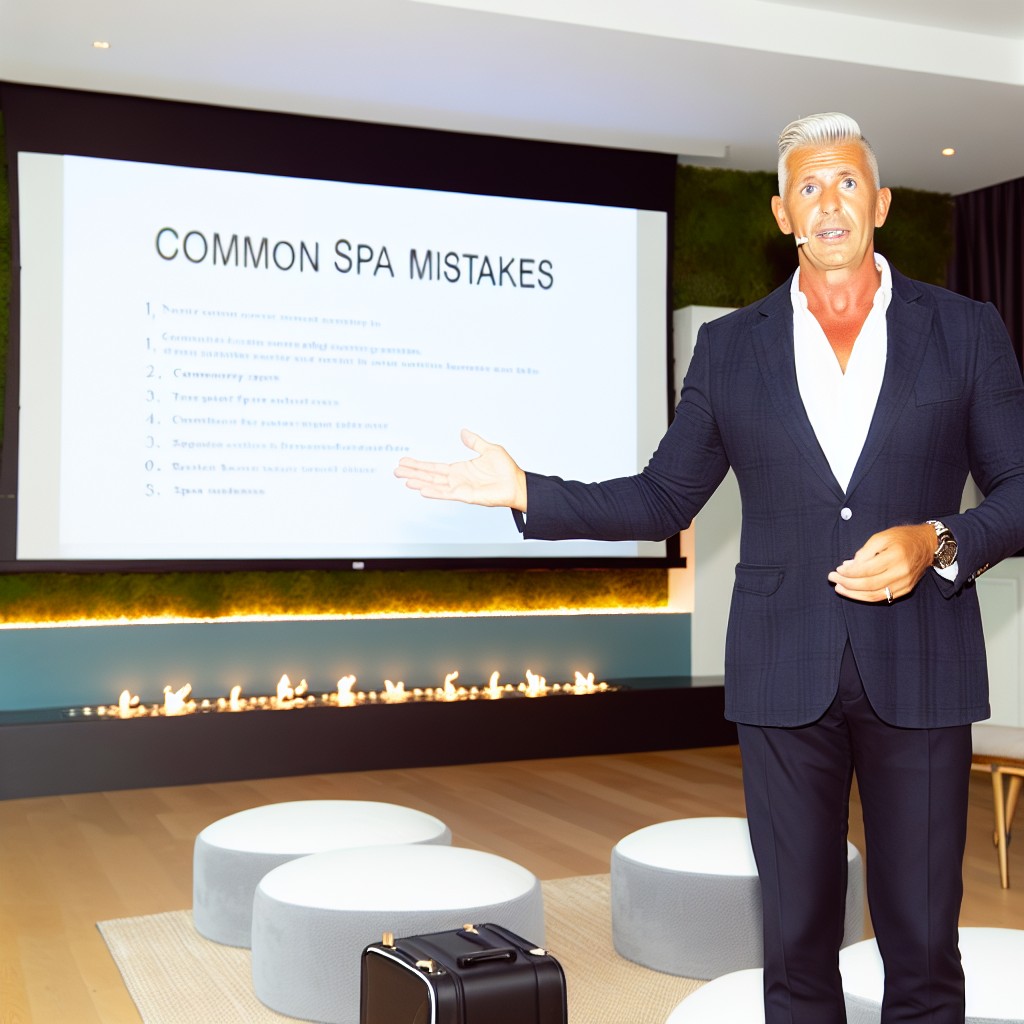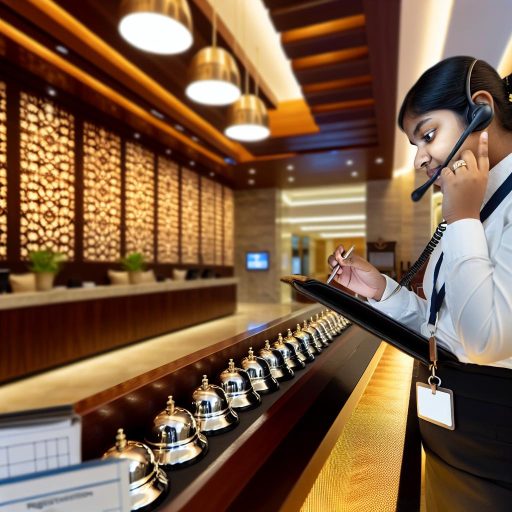Neglecting Market Research Before Launching the Spa
Importance of Market Research
Market research serves as a foundational step for any new spa manager.
It provides insights into local competition and customer preferences.
Market research helps identify target demographics effectively.
Additionally, it reveals gaps in the market that your spa could fill.
Consequences of Neglecting Research
Failing to conduct thorough market research can lead to poor decision-making.
It may result in offering services that customers do not want.
This oversight can ultimately decrease profitability and brand loyalty.
Moreover, overlooking local trends may leave a spa vulnerable to competition.
Steps for Effective Market Research
Begin by analyzing local competitors and their offerings.
Survey potential clients to gauge interest in various treatments.
Utilize online tools like Google Trends for additional insights.
Attend local wellness events to network and gather firsthand information.
Examples of Successful Market Research
Consider the example of Serenity Spa in downtown Denver.
They conducted surveys before launching and tailored services accordingly.
As a result, they exceeded initial customer expectations upon opening.
Another great example is Pure Bliss Spa, which identified a niche in organic products.
This focus attracted a dedicated client base and led to steady growth.
Underestimating the Importance of Staff Training and Development
The Foundation of a Successful Spa
A well-trained staff is crucial for a spa’s success.
It directly impacts customer satisfaction and retention.
When staff members possess necessary skills, they operate more effectively.
Furthermore, training fosters a positive work environment.
Common Misconceptions About Training
Some managers believe training is a waste of time.
This misconception can lead to high turnover rates.
In reality, ongoing training enhances employee confidence.
Additionally, it ensures that staff stay updated on industry trends.
Unlock Your Career Potential
Visualize a clear path to success with our tailored Career Consulting service. Personalized insights in just 1-3 days.
Get StartedCost vs. Value
Investing in staff training may seem costly.
However, the long-term benefits greatly outweigh the initial expenses.
Trained staff contribute to increased revenue through better service.
Ultimately, high-quality services attract more clients.
Implementing Effective Training Programs
Start by assessing the training needs of your team.
Surveys or performance evaluations provide valuable insights.
Next, create a structured training program tailored to those needs.
Incorporate hands-on practice and workshops for better engagement.
The Role of Leadership in Training
Spa managers must lead by example in promoting training.
Attend training sessions alongside staff whenever possible.
This involvement shows commitment to development.
Additionally, provide recognition for staff achievements related to training.
Continuous Development vs. One-Time Training
Training shouldn’t be a single event but an ongoing process.
Regularly revisit training programs to adapt to changes.
Emphasize continuous improvement for lasting impact.
Furthermore, encourage staff to pursue additional certifications.
Failing to Create a Comprehensive Business Plan
Importance of a Business Plan
A comprehensive business plan is essential for every spa manager.
It serves as a roadmap for the business’s future.
Additionally, it helps identify goals and strategies.
An effective plan allows for better resource management.
Moreover, it guides decision-making processes.
Consequences of Skipping the Plan
Neglecting a business plan can lead to disorganization.
Without direction, goals often become unclear.
This lack of clarity may hinder progress and growth.
Furthermore, it can result in wasted resources and time.
In the long run, businesses may struggle without guidance.
Key Elements to Include
Every business plan should include a market analysis.
Understanding the target audience is crucial for success.
A financial plan is also necessary to ensure profitability.
Define your marketing strategies to attract clients.
Lastly, outline an operational plan to streamline processes.
Regular Updates and Revisions
Business plans are not static documents.
Regularly update the plan to reflect changes in the market.
This helps ensure it remains relevant and effective.
Furthermore, revisions can help address new challenges.
Incorporating feedback is also essential for improvement.
Gain More Insights: Key Differences Between Hotel and Office Front Desk Roles
Ignoring Customer Feedback and Service Quality
Understanding the Importance of Customer Feedback
Customer feedback serves as a critical element in spa management.
It provides insights into service quality and client satisfaction.
Ignoring this feedback can lead to unmet expectations.
Subsequently, this oversight may result in negative reviews.
Additionally, valuable suggestions often go unheeded.
As a result, opportunities for improvement are missed.
Setting Up a Feedback System
A structured feedback system helps capture client opinions effectively.
Start by creating easy-to-use surveys post-visit.
Consider using digital platforms for quicker responses.
These tools can help identify trends in customer preferences.
Moreover, make sure to review feedback regularly.
This practice ensures that you stay informed on client sentiments.
Responding to Feedback
Actively responding to feedback builds customer relationships.
Thank customers for their suggestions, whether positive or negative.
Address any concerns promptly to show you value their input.
This approach fosters a sense of loyalty among clients.
Ultimately, it encourages repeat visits and referrals.
Prioritizing Service Quality
Maintaining high service quality is essential for success.
Consistently meet or exceed customer expectations.
Invest in training employees to enhance their skills.
Additionally, establish standard operating procedures for all services.
Frequent monitoring of service delivery is crucial.
This can be achieved through mystery shopper programs.
Creating a Culture of Excellence
Poor service can tarnish your spa’s reputation quickly.
Encourage a culture where every team member strives for excellence.
Promote open communication within your staff regarding feedback.
Recognize and reward employees for outstanding service.
Ultimately, a motivated team will provide better client experiences.
Gain More Insights: The Impact of Sommeliers on Modern Wine Culture
Mismanagement of Inventory and Supplies
Understanding Inventory Management
Effective inventory management is essential for spa operations.
It ensures that all necessary supplies are available when needed.
Additionally, proper management minimizes waste and expense.
Common Missteps in Inventory Practices
One frequent mistake is underestimating supply needs.
This error can lead to stock outages during busy periods.
Also, neglecting to monitor expiration dates can increase waste.
Furthermore, failing to categorize supplies can cause confusion.
Implementing Efficient Systems
Establishing a clear inventory tracking system is crucial.
Consider using specialized software for better accuracy.
This software aids in monitoring stock levels in real-time.
Regular Audits and Replenishment
Conducting regular inventory audits is vital for success.
These audits help identify discrepancies and address shortages.
Moreover, setting up a replenishment schedule streamlines restocking.
This strategy ensures you never run out of high-demand products.
Training Staff Effectively
Providing adequate training for staff on inventory procedures is important.
Knowledgeable staff can manage supplies more efficiently.
Regular training updates keep everyone informed on best practices.
Delve into the Subject: Career Growth Opportunities for Front Desk Agents

Overlooking Marketing Strategies and Online Presence
The Importance of Effective Marketing
Effective marketing is essential for spa managers.
It helps attract new clients and retain existing ones.
Neglecting marketing can result in lost opportunities.
Utilizing both offline and online strategies is crucial.
Many new managers fail to recognize this necessity.
Developing an Online Presence
An engaging website is vital for any spa business.
Your website should showcase services and pricing clearly.
Moreover, it needs to be user-friendly and mobile-responsive.
Additionally, social media platforms play a significant role.
They help connect with clients and build brand loyalty.
Utilizing Social Media Effectively
Social media marketing can significantly boost client engagement.
Post regular updates about promotions and skincare tips.
Engage with followers through comments and direct messages.
This interaction builds a community around your spa.
Furthermore, consider using paid advertising options.
They can increase your visibility and attract new clients.
Building a Strong Brand Identity
A strong brand identity sets your spa apart from competitors.
Consider your spa’s unique selling points (USPs).
Highlight these in your marketing materials.
Consistency in branding across all platforms is essential.
Your logo, colors, and messaging should match your values.
Tracking and Analyzing Results
Measuring the effectiveness of marketing efforts is crucial.
Utilize tools like Google Analytics to track website traffic.
Monitor social media engagement metrics regularly.
This data helps refine strategies for better performance.
Adjust accordingly based on what resonates with your audience.
Networking and Collaborations
Building relationships within the industry can benefit your spa.
Consider partnerships with local businesses for cross-promotions.
Attend industry events to network with other professionals.
These connections can lead to referrals and new clients.
Furthermore, share knowledge and experiences with peers.
This can enhance your marketing approaches and strategies.
Uncover the Details: Time Management Skills For Spa Managers
Setting Unrealistic Pricing Strategies
Understanding Market Dynamics
New spa managers often overlook the importance of market research.
Understanding local demographics helps set appropriate prices.
Additionally, observing competitors can highlight pricing trends.
Ignoring these factors can lead to significant pricing mistakes.
Establishing Value Perception
Clients equate price with value in spa services.
Overpricing can deter potential clients, even with high-quality services.
Conversely, underpricing may lead clients to question service quality.
Striking a balance is crucial for establishing value perception.
Incorporating Operational Costs
Managers must consider all operational costs when setting prices.
This includes employee wages, product expenses, and facility maintenance.
Failure to account for these can result in unprofitable services.
Regular reviews of operational costs will inform pricing adjustments.
Adjusting for Seasonal Variations
Seasonal changes can significantly impact spa demand and pricing.
Implementing seasonal pricing strategies can enhance profitability.
Additionally, offering promotions during off-peak seasons can attract clients.
Flexibility in pricing should reflect market demand fluctuations.
Communicating Pricing Changes
Any price adjustments must be communicated transparently to clients.
Friction arises when clients feel blindsided by sudden price increases.
Clear communication fosters trust and understanding with clients.
Providing rationale for changes can enhance client retention.
Utilizing Feedback for Future Pricing
Gathering client feedback is vital to understanding pricing perception.
Surveys can reveal how clients view pricing and services offered.
Utilizing this information helps adjust pricing strategies effectively.
Investing in customer satisfaction leads to successful pricing models.
Disconnecting from Community Engagement and Networking Opportunities
Importance of Community Engagement
Community engagement fosters strong relationships with local clients.
These connections enhance the spa’s reputation and visibility.
Moreover, engaged communities offer support and loyal customers.
Networking Benefits
Networking opens doors to potential partnerships with local businesses.
These relationships can lead to referral opportunities and collaborations.
Attending industry events also facilitates sharing of best practices.
Common Mistakes to Avoid
- Overlooking local events and gatherings.
- Failing to utilize social media platforms for outreach.
- Neglecting to build relationships with local influencers.
These errors can isolate a spa from invaluable community resources.
Strategies for Reconnection
Participate in community events to show support and involvement.
Host workshops or open houses to invite local residents.
Establish partnerships with schools and health organizations in the area.
Maximizing Local Resources
Utilize local suppliers and services to strengthen connections.
This approach supports local businesses and builds community trust.
Furthermore, promote cross-promotion opportunities with nearby establishments.
Additional Resources
Issue with travel agent! Should I have to pay? ADVISE PLEASE …
DON’T BE FOOLED!!! – Review of Sterling Inn & Spa, Niagara Falls …




